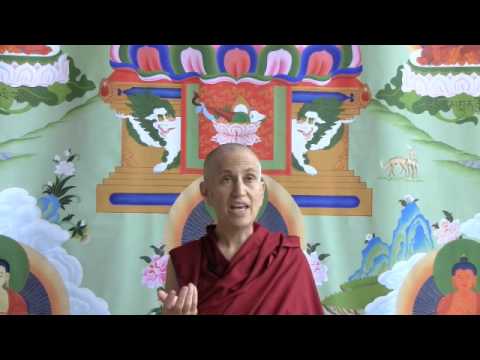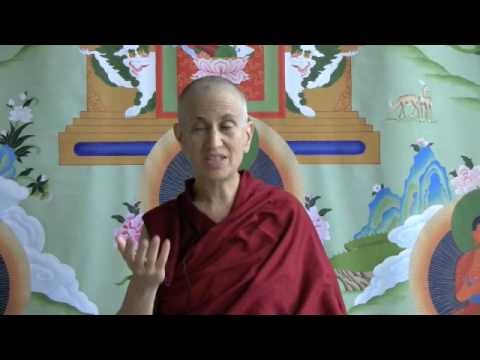The six sufferings of sentient beings
Stages of the Path #93: The Four Noble Truths
Part of a series of Bodhisattva's Breakfast Corner talks on the Stages of the Path (or Lamrim) as described in the Guru Puja text by Panchen Lama I Lobsang Chokyi Gyaltsen.
- The uncertainty and unsatisfactoriness of cyclic existence
- Our tendency to always want better and different
- The proper conclusion to draw when meditating on these topics
When we talk about the six kinds of dukkha that apply to all the realms of cyclic existence, the first one was that things are always uncertain, and the second is that things are unsatisfactory. The Rolling Stones had it right. But if we look at our minds, our minds are never satisfied. Whether we’re looking at somebody or something in the external world, we always want it to be better, we want it to be different. If we have this one we want that one. As soon as we get that one we want something else. Whatever we get goes out of style, it gets upgraded, so it’s unsatisfactory. The mind’s always dissatisfied, looking for more and better.
Also, even when we refer to ourselves, we aren’t very satisfied with ourselves, are we? We’re extremely self-critical, and always: “Oh, I should do this, I should be this, I should, I should….” And of course, what other people think of us, they’re always dissatisfied with us also. Then we get all tangled up trying to become what we think they want us to be. We get tangled up trying to be what we think we should be. We’ve never really stopped and looked at the situation at all, we just keep spinning around in circles like that.
When we realize the unsatisfactory nature of cyclic existence—not only how we’re dissatisfied in our lives, but wherever we’re born in cyclic existence it’s also unsatisfactory. When you have one kind of rebirth you want another kind. When you have that kind you want another kind. When you’re a human being you want a deva rebirth (a celestial rebirth). “Oh, I want to be a sense pleasure-realm god and have all these deluxe sense pleasures. That sounds really good.” But then you get that, and that’s great for a while, and when you die then you lose that, so it’s unsatisfactory. You want a state of single-pointed concentration, so you get that. You’re born in the form realm or the formless realm. That’s nice for a while. But when the karma gets finished with that then you fall down again to the lower realms and you’re again unhappy and dissatisfied. So there’s this constant dissatisfaction going on and on.
When we meditate on this if you come to the conclusion of, “Well, I’m always dissatisfied so screw the world,” that’s not the right conclusion. That’s the wrong conclusion. But many people come to that, don’t they? They look around and it’s like, “I’ve done this, I’ve done that, there’s nothing worth doing so I’ll just sit and get drunk all day because everything else is unsatisfactory.” Of course, your booze is also unsatisfactory. And it’s just more expensive than everything else you do. So just saying, “Well nothing’s worthwhile” is not the right conclusion to come to.
When we see that things are unsatisfactory, then we see it’s because of the nature of cyclic existence, and especially because we’re under the influence of attachment. As long as we have attachment everything’s going to be unsatisfactory. Isn’t it? No matter where we go, no matter what we do, no matter who we’re with, no matter how many arguments we win, no matter how many people like us, no matter what pleasure we have, what adventures we have, none of it’s going to cut it at the end. If we realize this early on, and we see that this is an attribute of cyclic existence, then we generate the wish to be free of cyclic existence. That’s the right conclusion.
How do we handle the dissatisfaction between now and when we attain liberation from cyclic existence? We reduce our attachment. The less attachment we have, the less dissatisfied we’re going to be.
We bring the dissatisfaction right into the monastery. I always tell people there are going to be various things you don’t like about the Abbey, or any religious community you go to. You’re not going to like the way the kitchen’s run. You’re not going to like the schedule. And you’re not going to like the way the prayers are chanted or how the meditation is structured. Right? Nobody’s happy with them. You bring your dissatisfaction in, you’re unhappy with those. And then you look around and you say, “Oh, you know, the grass is greener on the other side of the meditation hall.” Or another way to say it is, “Oh, they sing the chants nicer at this other monastery.” So then you want to go to another monastery. You want to go to another place. Just this same thing, looking for another something that’s going to make you more satisfied.
The point is that this is the nature of cyclic existence, meaning that it’s the nature of our mind that’s under the influence of clinging attachment, and craving, and ignorance. We have to aspire to be free, and before we do that, reduce that kind of craving for something new, something different, something more adventurous, something, something.
Now, reducing the craving and clinging, and reducing the dissatisfied mind, does not mean that if something is not working you whitewash it and say, “I’m going to be satisfied with this.” It doesn’t mean that in society if there is injustice—or even in the monastic community if there’s something that is not being done correctly—if there are human rights violations or something, it doesn’t mean you just say, “Well that’s just my dissatisfied mind, and if I were more satisfied these things wouldn’t matter, so just drop it,” that’s not right. I say this because we tend to go to a lot of extremes in our practice, and either very restless and dissatisfied or we just say, “Well, blah,” and that’s not a correct attitude either. If something is wrong, if something is not being done correctly, or somebody’s being injured, then we speak up.
Venerable Thubten Chodron
Venerable Chodron emphasizes the practical application of Buddha’s teachings in our daily lives and is especially skilled at explaining them in ways easily understood and practiced by Westerners. She is well known for her warm, humorous, and lucid teachings. She was ordained as a Buddhist nun in 1977 by Kyabje Ling Rinpoche in Dharamsala, India, and in 1986 she received bhikshuni (full) ordination in Taiwan. Read her full bio.


